Turkey's Alevi community doubtful of government initiatives
ISTANBUL

Alevi groups organized a rally for the 20th anniversary of the Sivas massacre, in which 35 people were killed in an arson attack in 1993. DHA photo
The government is working on a new plan to broaden the rights of Alevis, members of the second-largest Islamic sect in the country, but these fresh attempts have received a suspicious reaction from the community.
Prime Minister Recep Tayyip Erdoğan has asked for a study and report on the issue, Deputy Prime Minister Bekir Bozdağ revealed in a televised interview over the weekend, adding that a broad range of negotiations would follow after the new steps.
Bozdağ’s remarks came days before the anniversary of the July 1-2 killings of 35 people in an arson attack in 1993 led by a mob at a hotel where many Alevi intellectuals and artists who had come to Sivas for a conference were staying. On June 23, thousands gathered in Istanbul’s Anatolian district of Kadıköy to mark the day.
Bozdağ commented on the status of cemevis, Alevi houses of worship. “Our brothers from the Alevi and Bektaşi traditions have already granted a status to cemevis,” he said, adding that the government would not take steps to change this status but only ensure its existence.
However, responding to a question on whether cemevis were a place of worship, Bozdağ said the sole common place of worship for Muslims has always been mosques, and Muslims could worship all across the earth.
The government’s official stance is still that cemevis are "cultural centers," but not places of worship.
The ruling party has taken serious steps for Alevis, including sending Alevi leaders to meet the religious needs of Turks living abroad, adding information about the sect to schoolbooks with quotes from leaders of the community, and an apology by the prime minister for a massacre in 1938 in Tunceli, where the majority of the population is Alevi.
Responding to Hürriyet Daily News questions on the issue during a phone interview yesterday, Metin Tarhan, a lawyer for the Alevi Associations’ Federation, said the community's trust in the government was poor.
“Our first demand was to accept the legal status of cemevis as places of worship, and this was rejected. Now the government’s sincerity is being questioned,” he said.
The prime minister’s recent wording when describing the bomb attack in the southern city of Reyhanlı on May 11 also disturbed the community. “Fifty-three of our Sunni citizens were killed,” Erdoğan had said.
The prime minister of a country should never discriminate between its people, not only between sects, Tarhan said.
Alevis have also expressed unease over the naming of the to-be-built third bridge over Istanbul’s Bosphorus, which has been named after Ottoman Sultan "Yavuz Sultan Selim," who was known for massive killings of Alevis.
The government's latest gestures to Alevis come months before the March 2014 local elections.
Vercihan Ziflioğlu contributed to this report from Istanbul.
